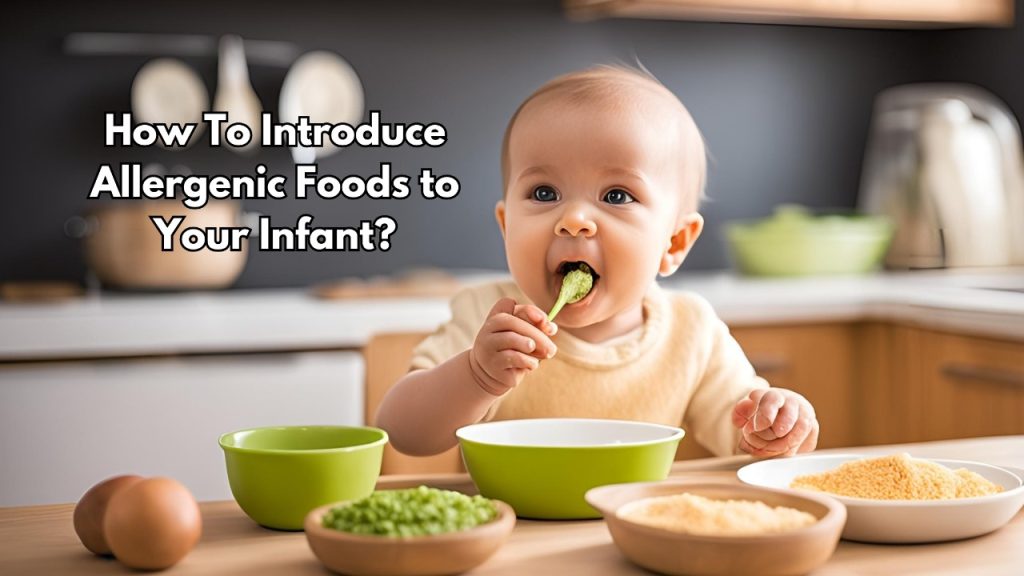Many parents worry about food allergies, but doctors recommend giving allergenic foods early on. This can help prevent allergies from developing. Baby led weaning helps them pick up food, explore different feels, and eat at their own pace. This helps them naturally learn about food.
However, taking it slow and steady works best when starting foods that might cause allergies. Your baby will show you when they’re ready to try new foods. They might reach for food from your plate or watch closely when you eat.
Common Allergenic Foods in Diets
It’s common for parents to often worry about starting foods that might cause allergies. Let’s make this journey easier with some simple tips. We will look at common foods that may sometimes cause allergies.
Milk and Dairy Foods
Most babies start their food journey with dairy products like yoghurt. You can start with small amounts of yoghurt mixed with fruits like bananas. Paneer is another great option when cut into tiny and soft pieces.
Nuts
You can make smooth pastes or fine powders from roasted almonds, peanuts and cashews for your baby. Always grind nuts very fine to prevent choking risks. Observe your baby closely when trying nuts for the first time.
Eggs
Eggs are a good source of proteins for babies. Start by offering well-cooked egg yolk in small amounts. You can also mix some yolk into soft rice or dal for an easy meal. You can add egg whites after trying yolk for a few days.
Lentils
We always have different types of lentils ready to cook. You can start with well-cooked moong dal since it’s light and easy to digest. You make sure to mash the lentils into a smooth paste.
Safety Tips to Remember
- Always try one new food at a time for three full days.
- Keep watching for any signs like rashes or upset tummy.
- Write down what foods you give and how your baby reacts.
- Talk to your doctor if you see any warning signs.
Take things slow and let your baby enjoy these foods slowly. Your baby will learn to love food just try to keep meal times happy and stress-free for the baby.

When to Start Introducing Allergenic Foods?
Most doctors say it’s best to begin around six months when your baby starts eating solid foods. Starting these foods early can help prevent allergies from developing. You can pick a time, usually in the morning or afternoon, to introduce these foods to them.
Give your baby just a taste of one new food at first. Then wait three to five days before trying another new food. This makes it easier to spot if something doesn’t go well with them. Many parents find breakfast or lunch works best for trying new foods. Your baby will be alert and hungry, plus you’ll have all day to keep an eye on them.
Signs of Allergy to Watch For
Skin Reactions
Every parent wants to keep their baby safe when trying new foods. Keep an eye out for any red spots or bumpy rashes on their skin. Your baby might get itchy or develop red patches that look like mosquito bites. These signs usually show up within minutes or a few hours after eating.
Gastro Issues
Your baby might signal you that something’s wrong through their tummy reactions. Watch for signs like throwing up or loose, watery poop after eating. Your baby might seem fussy and rub their belly because it feels uncomfortable.
Also Read:- Baby-Led Weaning Myths
Severe Reactions
Some reactions need quick medical help, though these are pretty rare. If your baby has trouble breathing or their face starts swelling, call your doctor right away. Observe if they start coughing a lot or if their voice sounds different.
What to Do Next?
- Keep your phone handy with your doctor’s number and emergency contacts.
- Write down what your baby ate and when you noticed any reactions.
- Take pictures of any rashes to show your doctor.
Most reactions are mild and easy to manage with your doctor’s help.
How to Safely Introduce Allergenic Foods?
You can start with just a small taste, you think about the size of a small crumb. This helps your baby get used to new foods without overwhelming them.
Keep food prep very simple when you’re starting out. Boil eggs until they’re really well done, or mash nuts into a smooth paste. Mix a small amount into foods your baby already enjoys and tolerates well.
You give each new food its own time. Don’t mix different new foods together at first. This helps you spot exactly what might cause any reactions. Your baby might love scrambled eggs one day and soft tofu the next.
You must cook everything well and mash foods until they’re super smooth. A good test is to see if the food squishes easily between your fingers. Make sure nuts are ground into a fine paste and never give whole nuts to babies. Always stay with your baby during meals so you can notice some reactions that might need your immediate reactions.
Managing Allergic Reactions
First things first, you try to stay calm, even though it might feel scary. Keep a notebook handy to write down any symptoms you notice. This helps your doctor understand exactly what happened. You must take clear photos of any rashes or swelling to show your doctor later.
Also Read :- Top 5 Tips to Handle Food Peer Pressure
Talk to your baby’s doctor about keeping some medicines for various reactions at home. They can tell you the right kind and amount to use for mild reactions. Never give any medicine without checking with your doctor first.
Some reactions need quick action. If your baby has trouble breathing or their face swells up, get medical help right away. Remember, most reactions are mild and manageable with proper care.




